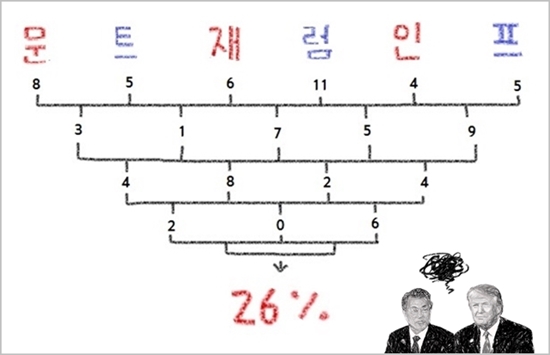Korean naming is quite different from English naming. Firstly, a surname comes first and a given name follows after, which are usually one character and two characters, respectively. However, there are very rare occasions where one uses a two-characters surname, one-character given name, or sometimes both of them. Each of the characters is mostly based on traditional Chinese characters, rarely used in China these days. However, there are names made of pure Korean words that are not based on Chinese characters, such as 하늘, which means sky, or 이슬, which means dew. These days, some people use English names as a given name, for example, 김에스더(Kim Esther) or 박리나(Park Lina), under the influence of globalization.
As one might notice at this point, there is no such thing as a middle name or name sharing (i.e. Alexander the second) in Korean naming. Also, married women keep their surname after marriage, while it’s the same that father’s surname is the one passed down to children, usually. However, it was not until 1997 that parents can choose which side’s surname to pass down to a child’s surname.
The naming practice in Korea is deeply affected by Chinese naming practice to the extent that they share the general structure and surnames as well, while there are differences in trends and details. Before the 7th century, Korean people (technically, there were more than one country, but I am referring to people from those countries, collectively) used pure Korean language to name themselves, but they borrowed Chinese characters to write their names. Starting from the 7th century, the Chinese naming system was introduced. However, having a surname was considered as a privilege that was only for people at higher ranks until the late period of the Joseon dynasty in which the law, which obligated people to have both surname and a given name, was enacted.
On the other hand, Japanese naming is somewhat different from Korean and Chinese naming systems. First of all, it follows the same order, a given name and then a surname, Japanese naming distinguishes them by space. In contrast, Korean and Chinese names have all in one word. Japanese names contain usually two to three characters in each of a given name and surname, but they are sometimes spoken in more syllables than characters because one character can be spoken as two syllables.
Since the characters are usually based on traditional Chinese characters, it is possible to give meaning to one’s name. For example, my given name, 상현, which can be written as 尙炫, means ‘shine more’. Traditional shamanism stresses the importance of characters that composes one’s name because it is said that it has a great influence on what kind of life one would live. Therefore, people sometimes change the characters of their names while keeping how it sounds in Korean the same. Also, another interesting fact about Korean naming is that people sometimes use names to find out if two people have good chemistry for fun. This can be done in a few simple steps. First, write the characters of their in turn in a single row. After writing the number of strokes of each character in a row below, keep adding two adjacent numbers to write down on the next rows. If the number exceeds 10, reduce it by 10. For example, if one gets 13, write down 3. In the end, there will be only two numbers reaming, which stands for their chemistry. The following image is a fun example of demonstrating it with the names of two former presidents of Korea and the US: Korean former president Moon Jae-In and US former president Donald Trump.


Replies
Thanks Jason, for this informative post. It was interesting to learn even more about Korea's unique naming standards, and I didn’t know a lot of these facts. As much of Korea’s culture stems from Confucianism, I’m surprised that married women kept their surname at one point, as Confucianism is pretty patriarchal. It’s also interesting to read the comparisons between Korean, Japanese, and Chinese naming standards.
I could not stop laughing when I saw the image at the end because I also tried it during my middle school and high school years. My name is 김동윤 Kim Dongyoon, which is formed with Chinese characters meaning trustable person in the East. I like my name that has meaning with Chinese characters, but I also imagine what if I had a Korean name. Nice cultural post about the Korean naming system.
Interesting post Jason! The chemistry comparison at the end was funny! One interesting thought that came up when reading your post was the significance of putting surnames before given name. In Chinese culture (and in other cultures), family is a major aspect of traditional and modern day values, so by putting the surname before given name emphasizes the importance of family.
Also, I agree with your thoughts on the meaning of names. My given name is 雯静, and it is a feminine way of writing "文靜". 文靜 means gentle, quiet, literate, and cultured, so I guess when my parents named me, that was what they had in mind for me to grow up to become. I would say they were fairly accurate. :)